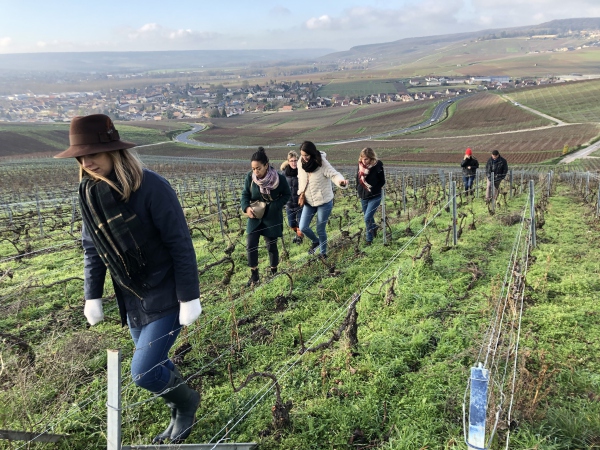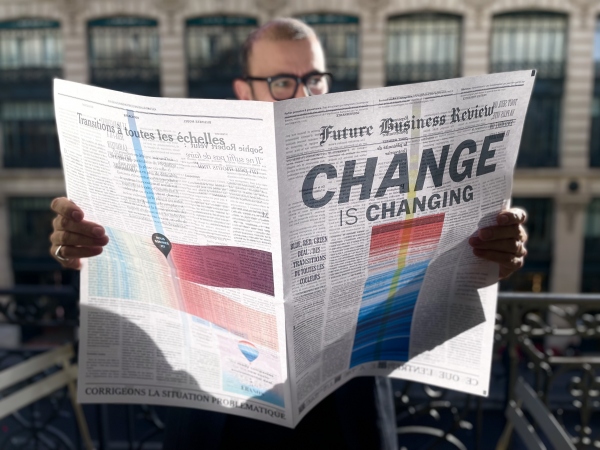Businesses are navigating a new socio-environmental landscape. What exactly is this new socio-environmental landscape? It encompasses the human and material conditions from which businesses can create value.
These conditions haven’t changed abruptly. Temperature shifts, rising sea levels, declining biodiversity, resource scarcity, eroding customer trust, and evolving attitudes towards work progress in such gradual increments that to our eyes, the indicators of their levels may appear similar. Yet, the earlier changes were like blue hues, and the most recent ones are a deep scarlet, illustrating how delicate the gradient is and how long the series has been.
Connecting the Dots
For some companies, this new reality is still a set of disconnected points: talent drain, office fatigue, concerns about AI, inflation, and multiple crises. It feels like a series of surprises or misunderstandings. For others, this new reality is already very concrete and has led leaders to rethink their business models or adapt their operating models.
❝What if austerity is how we live now, and abundance is what lies ahead?❞— Rebecca Solnit
In both cases, many of our personal and professional assumptions are losing their power or becoming ineffective. New expectations for work force us to rethink our management strategies. The world's finitude compels us to reassess our economic equations. AI challenges years of schooling or training. Changes in society and willingness to buy force us to rethink the value of our products and services. Ecological upheavals drive us to invest in system resilience (being "antifragile"). New generations demand accountability for our participation in extractive businesses. All these constraints challenge the freedom, creativity, and desire needed to develop a business, but they also shake our very identity.
Polytransition not only requires us to learn but also expects us to relinquish a part of ourselves. It’s no longer just about transforming the organization; it’s about transforming ourselves: a personal, sometimes intimate, examination of our values and the reason for our existence is required. The nature of change itself has changed.
Panic & Yawning
The effort is immense. And what gain can we hope for? What transitions promise in return is to replace our possessions with fewer things, fewer conveniences, fewer possibilities. Travel, meat, comfort... The world of tomorrow makes some fear that they will be moving in a sail cart from an Amish village, illuminated by an oil lamp. “We are living through the end of abundance” (E. Macron). We are told: “It’s going to be tough, we’ll need to work hard, and the best you can hope for is still less than before.” Ecology “manages to both panic minds and bore them to tears” (B. Latour). In this venture, the spirit of desire is not engaged.
A significant part of the reluctance to engage in polytransition stems from this fear of having to give up many things, which we associate with success. This suggests that we are heading towards a life where we will be poorer.
What Are We Already Lacking?
If we examine our lives closely, we may find that “through measures other than goods and money, we are already impoverished” (R. Solnit). Perhaps the impoverished world is the one we live in now.
We lack clean air: 1 in 5 deaths can be attributed to fossil fuel combustion (A. Bernstein). We lack biodiversity: there are 4Gt of animals on the planet compared to 8Gt of plastic (E. Elhacham et al.). We lack silence: urban noise pollution is one of the top three emerging threats (EU, UN). Yet, paradoxically, we also lack noise: biophony (the soundscape of life) has diminished by up to 70% in certain places (B. Krause, S. Simpson, S. Butler). We lack satisfaction broadly: we are impoverished in utility and dignity (R. Kennedy). We lack attention: we seek and overwhelm others’ attention, while becoming increasingly unable to listen to ourselves (D. Boullier, Y. Citton). Finally, we lack hope: 44% of young people feel despair over climate change (C. Hickman et al.). Each person can add to this list.
So, could it be that austerity is how we live now, and abundance might be what is to come? (R. Solnit).
Giving Up Things That Would Actually Improve Our Lives
Preparing for the new socio-environmental paradigm can feel unacceptable if it means giving up what we associate with success. Because that would be akin to giving up on ourselves. "If you miss understanding the emotions that drive people when they are told they must undergo these enormous lifestyle changes, we won’t achieve anything" (B. Latour). However, the transition might not necessarily mean impoverishing ourselves, if it involves "abandoning things that, without which, we would be better off: from deadly emissions to persistent feelings of misfortune and complicity in destruction" (R. Solnit). It’s not our old ideas and possessions we need to cast aside. We need to move away from habits that lead to a poor quality of life.
To achieve this, all levels must be involved: business models, governance, societal and partnership stakeholders, management. It’s not just the company that needs transformation; it’s all the forces within it that need to be given reasons, assurances, and the necessary security to engage in transitions. The company reconnects with performance. Its employees are productive, its products are sold, and its growth comes from value. Momentum, enthusiasm, and engagement from all life forces are renewed when the company, prepared for the new socio-environmental paradigm, becomes a source of a better life.




